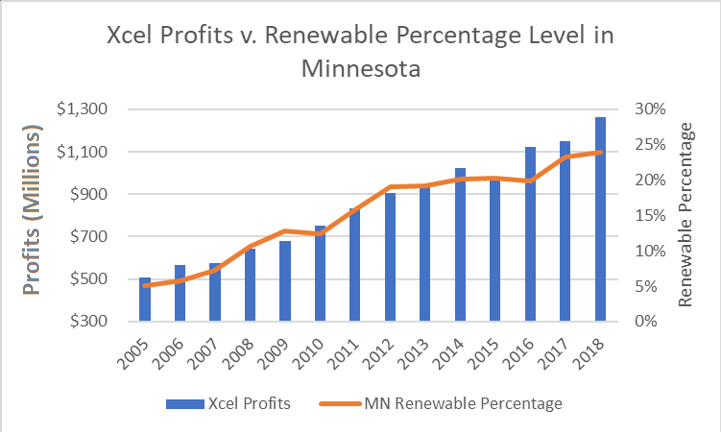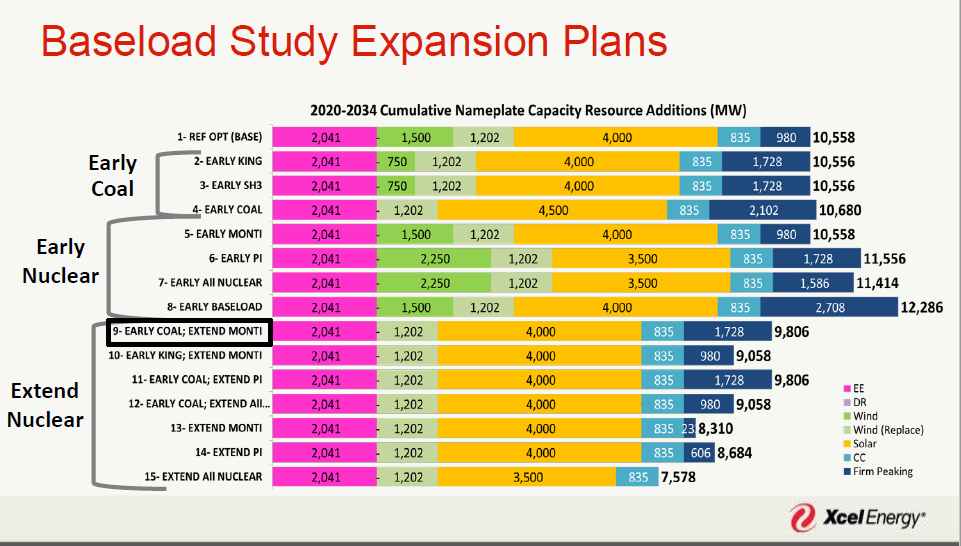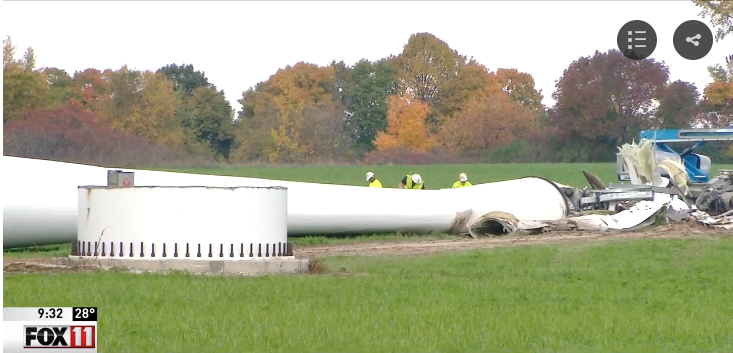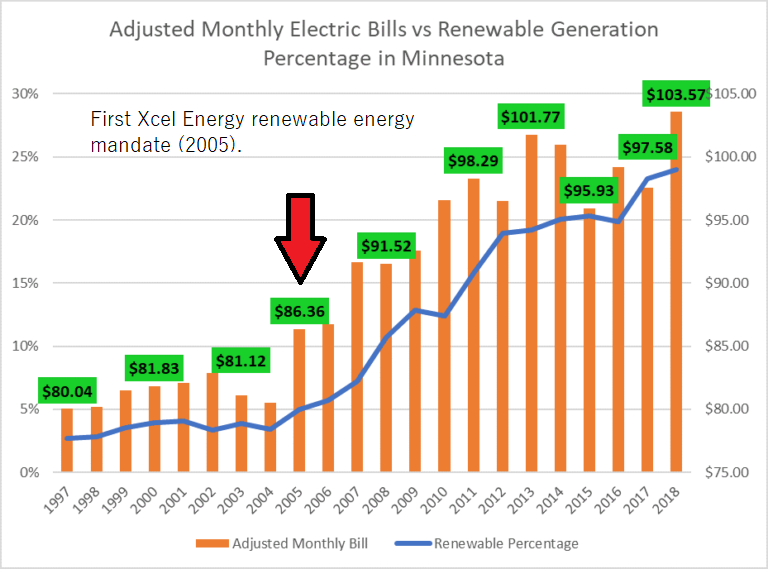Xcel Should Skip the Solar and Wind and Plan for A Nuclear Future
Last weekend the Minneapolis Star Tribune ran an article entitled Xcel Looks At New Nuclear Options As it Moves to Carbon-Free Power Goals. The article explains that nuclear energy is critical to Xcel Energy’s carbon free energy plans and the role that newer nuclear reactors could play in their energy portfolio.
It is very telling that Xcel wants to build new nuclear power plants because according to a recent filing with Minnesota regulators, the company clearly knows that building a grid to operate on high levels of wind and solar penetration is a recipe for the kind of blackouts that recently affected 2 million people in California, and caused widespread power outages in Australia a few years ago.
If Xcel knows wind and solar don’t work, why are they looking to waste billions of dollars on these energy sources when the company knows it will rely on nuclear power plants in the future? The answer boils down to crony capitalism and perverse profit incentives.
Xcel Energy Is Not A Private Company
Like we have stated many times before, Xcel isn’t a private company, they are a government-approved monopoly. This means Xcel Energy customers have zero freedom to choose another electric company if they don’t like Xcel’s business practices. It also means Xcel doesn’t get to make a profit on the electricity they sell.
Instead, they are allowed to make a guaranteed profit every time they spend money on new power plants and even corporate offices. The more Xcel spends, the more profit they make. This is why Xcel’s profits have increased dramatically as the company has spent billions of dollars on renewable energy, as you can see in the graph below.

As you can imagine, this bad incentive structure gives Xcel a powerful incentive to spend as much as possible, which is where wind turbines, solar panels, natural gas, and nuclear power plants come into play.
Fleecing Families With Wind and Solar
Wind and solar are a profit-seeking utility executive’s dream come true.
Not only do wind and solar cost more to build than new natural gas plants, according to the Energy Information Administration, but they also don’t work when the weather isn’t cooperating. As a result, Xcel will also need to build a lot of natural gas power plants to make sure we don’t have blackouts after the sun goes down and people still want to use air conditioning.

Not only do wind and solar cost more and require natural gas backup power plants, they also don’t last very long.
According to the National Renewable Energy Laboratory (NREL), wind turbines only last for 20 years and solar panels have 25-year warranties. This means every wind turbine and solar panel built today will be scrap metal by 2050, the year Xcel claims it wants to be carbon free. Some of Xcel’s wind turbines haven’t even lasted for 20 years, as Xcel to spend $1.4 billion refurbishing wind turbines that are only 10 years old, according to the Wall Street Journal.

As far as profit seeking goes, the combination of renewables and gas delivers huge dividends to Xcel Energy shareholders at the expense of the Minnesota families and businesses who are paying more for their electricity than ever before, according to data from EIA.

A better plan would be to skip wind and solar entirely and use Minnesota’s existing energy resources, namely coal, natural gas, and nuclear power plants to keep electricity costs low until new nuclear plants are ready for prime time.
A Better Way
Center of the American Experiment’s award-winning research Doubling Down on Failure: How a 50 Percent by 2030 Renewable Energy Standard Would Cost Minnesota $80.2 Billion found that using nuclear power instead of wind and solar would save Minnesotans billions of dollars while doing more good for the environment at the same time. Nuclear plants have the added bonus of lasting for up to 80 years, which means they are the most permanent solution to reducing carbon dioxide emissions around.
There are roadblocks to Xcel pursuing a nuclear future, however. One roadblock is the fact that it is currently illegal for anyone to build a new nuclear power plant in Minnesota, and liberal politicians refuse to legalize this reliable source of carbon-free power because they’d prefer to pretend that wind and solar can keep the lights on, even though the blackouts that hit California clearly show they can’t.
If not for the ban on new nuclear plants, Xcel could look at building nuclear plants using South Korean technology. Just one of these power plants could provide more electricity than Minnesota’s entire wind fleet, and these reactors have been successfully built in other countries, such as the United Arab Emirates.
Another roadblock is timing. The small modular reactors Xcel is investigating won’t be ready until the late 2020’s to early 2030’s. This means these promising technologies have a lot to prove in terms of whether they will be ready to supply the grid with reliable, affordable power within the next decade.
Even with the delayed deployment date, it makes more sense to save for the most-permanent solution possible, rather than spend a lot of money on energy sources that will only last for 20 to 25 years, and still require natural gas backup.
Conclusion
I grew up on a small dairy farm in Wisconsin. When I was very young, probably around four years old, my dad had an old Ford tractor that would constantly break down. It was so unreliable that I had given it the nickname “The Stupid Blue One.” Then one day, my dad drove into the driveway in a big, red Case International Magnum tractor. I was immediately in love with it.
One day, when I was sitting in the tractor next to my dad (I was still around four or five years old), my dad said “Isaac, you can spend your money on a lot of little things like candy or toys that don’t last or break, or you can save your money and get something big like the Magnum.” This is probably the most important advice I’ve ever got from my dad.
In Minnesota, we shouldn’t waste our money on things that don’t last. We should be prioritizing durable, long-term, reliable options for our electricity generation needs. If Xcel knows that nuclear power is the future, the company should not be squandering billions of dollars over the next decade on things that won’t last. Instead, the company should allow Minnesota families to keep more of their own money by utilizing their existing coal, natural gas, and nuclear plants until the end of their useful lifetime. Then, the company can replace these options with new nuclear power plants that will last much longer than wind or solar.
Unfortunately, Xcel Energy has no incentive to pursue this plan even though it is better for their customers.
Why would the company do the right thing and save their customers money when they can use their government-approved monopoly status to charge families more for their electricity and enrich their shareholders and CEO? As the laws are currently written, Xcel has zero incentive to do the right things and every incentive to do the wrong ones.
This is why Minnesotans need the freedom to choose their own electricity provider. Only the fear of losing customers will compel Xcel to keep costs low for their customers.